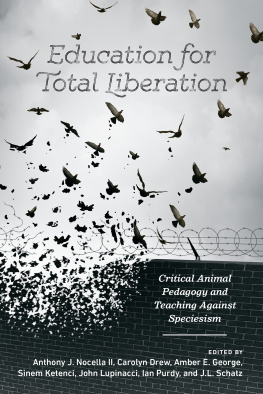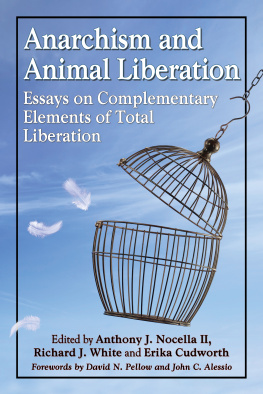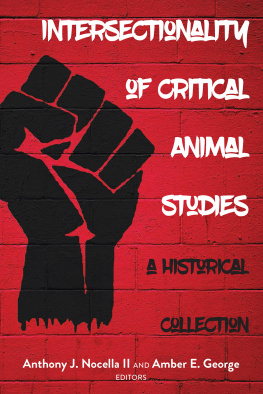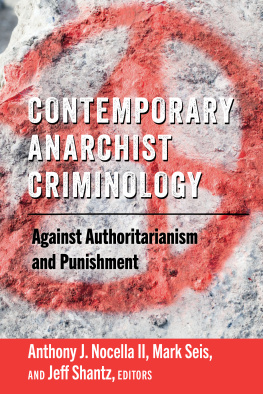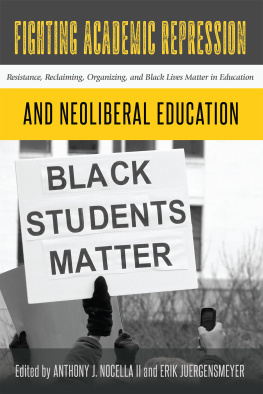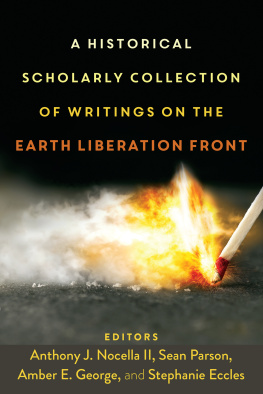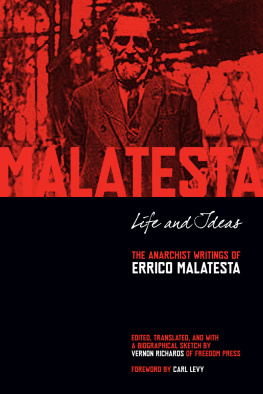Anthony J. Nocella II - Classic Writings in Anarchist Criminology
Here you can read online Anthony J. Nocella II - Classic Writings in Anarchist Criminology full text of the book (entire story) in english for free. Download pdf and epub, get meaning, cover and reviews about this ebook. year: 2020, publisher: AK Press, genre: Politics. Description of the work, (preface) as well as reviews are available. Best literature library LitArk.com created for fans of good reading and offers a wide selection of genres:
Romance novel
Science fiction
Adventure
Detective
Science
History
Home and family
Prose
Art
Politics
Computer
Non-fiction
Religion
Business
Children
Humor
Choose a favorite category and find really read worthwhile books. Enjoy immersion in the world of imagination, feel the emotions of the characters or learn something new for yourself, make an fascinating discovery.

- Book:Classic Writings in Anarchist Criminology
- Author:
- Publisher:AK Press
- Genre:
- Year:2020
- Rating:5 / 5
- Favourites:Add to favourites
- Your mark:
- 100
- 1
- 2
- 3
- 4
- 5
Classic Writings in Anarchist Criminology: summary, description and annotation
We offer to read an annotation, description, summary or preface (depends on what the author of the book "Classic Writings in Anarchist Criminology" wrote himself). If you haven't found the necessary information about the book — write in the comments, we will try to find it.
Classic Writings in Anarchist Criminology — read online for free the complete book (whole text) full work
Below is the text of the book, divided by pages. System saving the place of the last page read, allows you to conveniently read the book "Classic Writings in Anarchist Criminology" online for free, without having to search again every time where you left off. Put a bookmark, and you can go to the page where you finished reading at any time.
Font size:
Interval:
Bookmark:
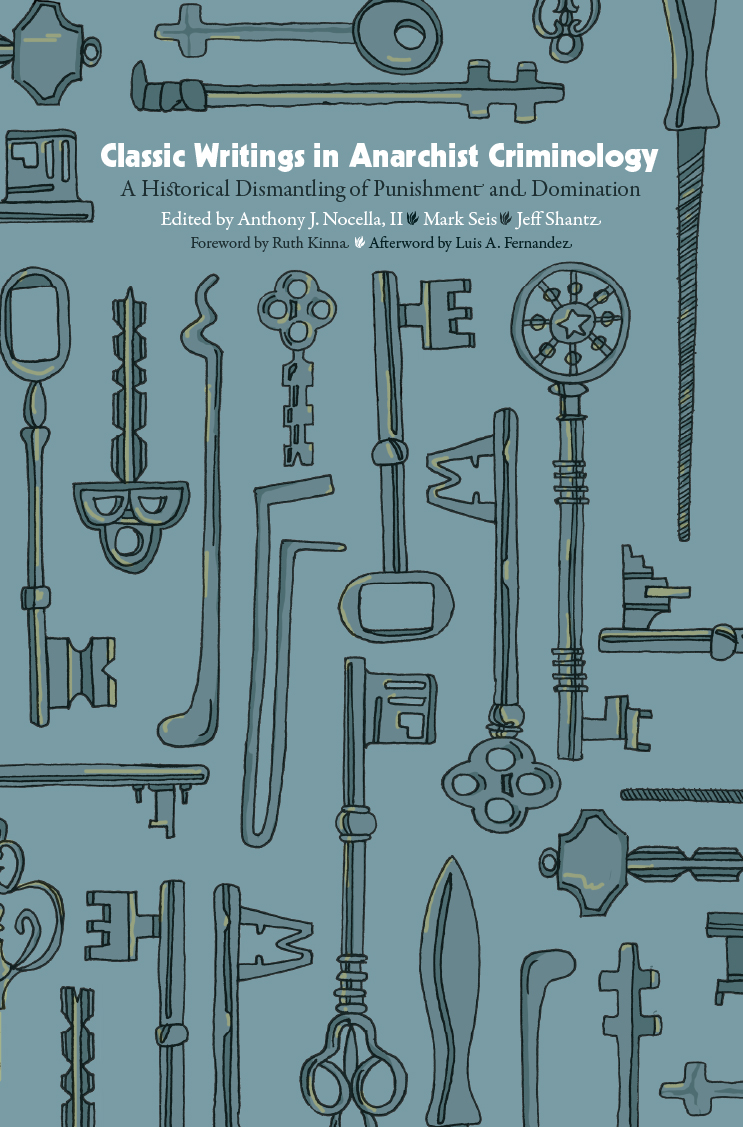
A Historical Dismantling of Punishment and Domination
edited by
Anthony J. Nocella II,
Mark Seis,
and Jeff Shantz
Foreword by Ruth Kinna
Afterword by Luis A. Fernandez

This book is an outstanding collection of classic writings on anarchism a great scholarly resource on the history of alternatives to punishment, prisons, and punitive justice.Dr. Erik Juergensmeyer, Editor, Green Theory and Praxis Journal
Classic Writings in Anarchist Criminology is must-read book for those who know the criminal justice system is broken, and wants effective solutions. This collection lays out the theoretical foundation for scholars, politicians, practices, and activists to create sound solutions, sure to challenge the failing criminal justice system.Dr. Amber E. George, Editor, Journal for Critical Animal Studies
Classic Writings in Anarchist Criminology is a book that every person that is interested in criminology must read.Madelynne Kinoshita, Save the Kids
This book shows that there is a long brilliant history of people working to dismantle domination, control, and punishment.Poetry Behind the Walls
A rich and provocative collection of writings that contribute to current abolitionist movementsexamining past thinkers enables us to better examine our current problems and imagine alternative solutions!Dr. Jason Del Gandio, co-editor of Spontaneous Combustion: The Eros Effect and Global Revolution
Classic Writings in Anarchist Criminology brings together an outstanding collection of essays written by some of the most intelligent and influential anarchists that have ever walked the earth. Importantly, their arguments continue to burn with a ferocious intensity, bringing new understanding and insight as to why social justice alternatives to crime and punishment are needed. My hope is that this powerful book will sparkor reignitea beautiful spirit of revolt, resistance, and commitment to freedom for all, within those fortunate enough to read it.Dr. Richard J. White, Sheffield Hallam University
This book is dedicated to everyone, human and nonhuman, that is locked up, tortured, and confined in every jail, detention, prison, cage, tank, handcuff, cell, padded room, unit, and chain.
We, the editors, would like to thank everyone at AK Press for believing in and supporting this book. We could not think of a better press to publish this book with than AK Press. We would also like to thank our academic departments for their support and friendship. Thank you to our human and nonhuman family and friends. Nothing is possible without others. We are all dependent on others; no one is an island. Thank you also to those today and through history who identified as anarchists and fought for the liberation and freedom for all. Finally, we would like to thank Richard J. White, Jason Del Gandio, Luis A. Fernandez, Madelynne Kinoshita, Amber E. George, and Erik Juergensmeyer who wrote reviews of the book prior to publication.
Ruth Kinna
One of the exhibits in the Kropotkin House Museum in Dmitrov, near Moscow, is a pencil or charcoal sketch by Kropotkin depicting him in his prison cell. The space is small, dark, and frightening and it perfectly captures the isolation and bleakness of incarceration.
Kropotkin was hardly the only anarchist to gain personal experience of the prison system or to use his reflections on his imprisonment to think more broadly about the operation of the bourgeois justice system and the punishment regimes that are integral to it. As the editors of this pioneering collection argue, anarchist critique draws anarchists magnetically toward its analysis. That is not to say that anarchism is defined by criminology (understood in a narrow sense) but that the anarchist refusal to recognize the justice of our current political arrangements effectively criminalizes the doctrines anarchists espouse and encourages anarchists to place questions of order at the heart of their social theory. Anarchists often wrote about prison because, like Alexander Berkman, they were deeply affected by their experiences. Anarchists analyzed crime, punishment, discipline, and social compliance because of the critiques of power, domination, and authority they advanced.
Looking again at the substantial body of work that anarchists produced on crime and criminology reminds us of the practical force of anarchist critique. The eloquent arguments that anarchists put to their accusers were intended to highlight the translation of legal norms into policy. When the Chicago anarchists explained the tyrannical nature of the property laws enshrined in the constitution and protected by the state, they were not simply making a technical point about justice and injustice. They were explaining the consequences of the power asymmetries that the justice system upheld for millions of dispossessed and exploited peoples. It did not follow, Albert Parsons argued, that because a man is a judge he is also just. Leaving questions of individual virtue aside, the American courts were packed: candidates for judgeships, throughout the United States were named by corporation and monopoly influences. More than one Chief Justice had been appointed to the bench of the US Supreme Court at the behest of leading railway magnates. No wonder, then, that justice was systematically denied to the poor and unemployed. Parsons described the streets of Chicago filled with 30,000 men in compulsory idleness; destitution, misery and want upon every hand facing the First Regiment out in a street-riot drill practicing a street-riot drill for the purpose of mowing down these wretches the working people are to be slaughtered in cold blood, and men are drilling upon the streets of the cities of America to butcher their fellow men when they demand the right to work and partake of the fruits of their labor. How far things have changed since 1887 is a moot point. Of course, situations vary across the globe and unemployment is only one of the issues that attracts aggressive policing. But the thrust of Parsonss analysis is about the institutionalization of injustice, the legality of violent repression and the unreasonable measures deployed to regulate disadvantage.
Revisiting anarchist criminology also draws attention to the alternatives that anarchists propose when they attack the prevailing order. The anarchist critique of bourgeois justice was targeted, not generalized. Indeed, it was predicated on an alternative conception of justness. Those who followed Proudhon described justice as immanent, and understood it as a contingent idea, simultaneously a condition and a practice that emerged from individual reflection or reason and social engagement. Like Nietzsche, anarchists denied the possibility of making absolute, universal moral judgments and the possibility that justice could be externally imposed. Justice emerged as part of a social process. Thus in attacking the unfairness and corruption of bourgeois justice systems, anarchists did not dismiss the possibility that rules could be broken, that norms could be transgressed or that harms could be inflicted. The point that Kropotkin made in Law and Authority was that military, clerical, and political elites adopted community rules and customs and gave them a new spin. Law corrupted established social practices and fixed them authoritatively so that they could always be enforced coercively and changed only when it suited the ruling elites.
Font size:
Interval:
Bookmark:
Similar books «Classic Writings in Anarchist Criminology»
Look at similar books to Classic Writings in Anarchist Criminology. We have selected literature similar in name and meaning in the hope of providing readers with more options to find new, interesting, not yet read works.
Discussion, reviews of the book Classic Writings in Anarchist Criminology and just readers' own opinions. Leave your comments, write what you think about the work, its meaning or the main characters. Specify what exactly you liked and what you didn't like, and why you think so.


